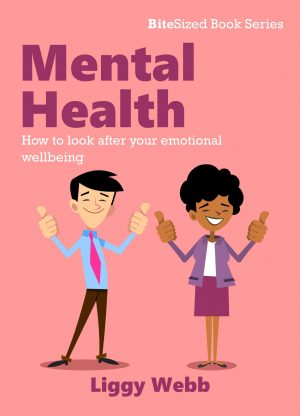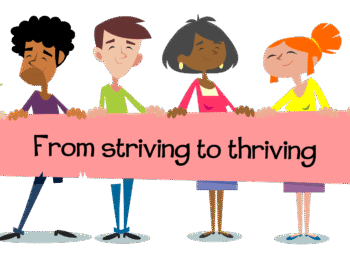The World Health Organization recognises “World Mental Health Day” on 10th October and the theme this year focuses on increasing investment in mental health services worldwide and improving access to care, especially in culturally diverse communities and areas with fewer resources.
Having experienced depression myself I can totally empathise with the struggles that many people experience and no matter who we are, we all need to look after our mental health.
Life in the digital age certainly has its own unique set of challenges and learning to pace ourselves well and prioritise self-care in a rapidly changing and often volatile and uncertain world is essential.
So how is your mental health right now?
This spectrum serves as a useful way to gauge where we are currently at with the state of our mental health

“Floundering to flourishing” is central to the work of Corey Keyes, a renowned sociologist and professor at Emory University.
Keyes is an acclaimed pioneer of positive psychology and is credited with challenging the traditional view that mental health is simply the absence of mental illness.
His work encourages a societal shift from simply treating mental illness to actively promoting mental health. You can explore this concept in more detail in his book, Languishing: How to Feel Alive Again in a World That Wears Us Down (2024).
So here is a brief description of each of the components:
Flourishing – This is the state of complete mental health where we exhibit high emotional, psychological, and social wellbeing. When we are flourishing we feel good, function well, and find ourselves actively engaged with our life, purpose and community. It is indeed the sweet spot.
Moderating – This state is we have a moderate level of wellbeing and function ok. We may have a reasonable number of positive feelings although we know we could feel a bit more energised and engaged.
Languishing – This is the state where we feel minimal positive emotions and may even feel like we are “stuck in a rut” or have a sense of emptiness, stagnation and feel we lack vitality. It is important to be aware that this state could put us in a significant risk factor of developing a mental illness in the future if we don’t manage it.
Floundering – This state is where we experience mental illness and are unable to function properly and need professional support.
This is a useful model in helping us to identify where we are in terms of our mental health.
So, what can we do to look after our mental health?
I would like to share a few fundamental and useful tips that I have personally found very useful:
Get moving
Exercise and movement are such powerful tools when it comes to looking after our mental health and have been scientifically proven to be as effective as medication for mild-to-moderate depression and anxiety. When we get moving and exercise it releases endorphins and other “feel-good” brain chemicals, reduces stress hormones (like cortisol), and improves self-esteem.
Aiming for at least 30 minutes of moderate intensity exercise most days, or incorporating “exercise snacks” like short walks or stretching throughout our day can be so energising and beneficial.

Cultivate social connection
The relationship between loneliness and depression is strong, complex, and bidirectional, meaning that loneliness can lead to depression, and depression can also cause or worsen feelings of loneliness.
Cultivating strong, healthy social bonds are linked to longer, healthier lives and act as a buffer against stress, anxiety, and depression. Socialising releases oxytocin, which promotes feelings of calm and wellbeing. It helps to intentionally spend time with people and look for opportunities to participate in community activities and find ways to help others too.
Embrace the benefits of nature
One of the most powerful remedies for low mood and depression is spending time in natural environments like a park or forest. This has been scientifically proven to lower levels of the stress hormone cortisol, decrease rumination (repetitive negative thoughts), and boost mood-regulating neurotransmitters.
As a big fan of Japanese approaches for wellbeing I can really advocate the concept of “Forest Bathing”. In Japan this is known as Shinrin-yoku, and is the practice of consciously immersing ourselves in the atmosphere of the forest or other natural environments using all our senses.
It’s not about strenuous hiking or exercise, but rather a slow, mindful, and contemplative way of being in nature to promote wellbeing and reduce stress. The term literally translates to “taking in the forest atmosphere”. This photo was taken with Elvis after a glorious walk through Westonbirt Arboretum near Bath. A place I would highly recommend visiting as the trees are stunning there.

Embrace lifelong learning
Learning gives our life direction and helps us to feel more engaged with the world. The pursuit of a new skills or knowledge provides a goal to work toward, which creates motivation and a sense of purpose, helping to combat low moods and times where we may find ourselves languishing.
When we are deeply engrossed in learning or practicing a skill, we can enter a state of flow which is a feeling of energised focus and enjoyment that is intrinsically rewarding and contributes to overall happiness and wellbeing.
Humans are naturally wired for growth and lifelong learning nurtures this innate drive, contributing to self-actualisation which is the realisation of our full potential and purpose

Prioritise quality sleep
I cannot begin to emphasise how valuable it is to get enough adequate and restorative sleep. This is crucial for emotional regulation, cognitive function and mental resilience. Poor sleep is linked to increased risk and severity of conditions like anxiety and depression. So establishing a consistent sleep schedule, create a relaxing bedtime routine, and limiting screen time, alcohol, sugary snacks and caffeine before bed can all be helpful.

Get support if you think you need it
If you are floundering it is so important to get support. This is not a sign of weakness it is a sign of courage and strength. Therapies like Cognitive Behavioural Therapy (CBT) are evidence-based, structured treatments proven to be highly effective for a wide range of mental health conditions. Many workplaces have excellent EAP’s – Employee Assistance Programmes that offer a whole host of support services as well as mental health first aiders who can direct you to these resources.

Please note: This information is for educational purposes only and is not a substitute for professional medical or mental health advice, diagnosis, or treatment. If you are struggling with your mental health, it is highly advisable that you consult a qualified healthcare provider.
-
 Mental Health£2.99
Mental Health£2.99
For updates for future blogs, free webinars and various other useful resources please do join my newsletter.












 Get set for September
Get set for September


